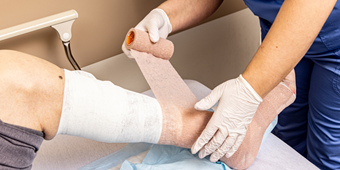Relationship Between Diabetes And Nutrition Complex, But Manageable

Find Your Perfect Match
Answer a few questions and we'll provide you with a list of primary care providers that best fit your needs.
The relationship between diabetes and nutrition can seem complex, especially if you've been newly diagnosed with the disease.
Suddenly, after possibly having given relatively little thought to what you eat, you now find yourself having to count calories, consider carbohydrates, and carefully plan when you have meals. It can be an overwhelming feeling, but not something you can't conquer with the right education, says Miguel Parilo, MD.
The relationship between diabetes and nutrition is multifaceted and involves your body’s ability to use carbohydrates, protein, and fat for energy. All of these require insulin, but carbohydrates require a more immediate secretion of insulin soon after being eaten. Carbohydrates are the major source of blood sugar, or glucose, a molecular formula found in the blood that helps the brain and nervous system function properly.
“Our lifestyles, which involve exercise, what and how much we eat, and weight gain, affect our need for insulin,” said Dr. Parilo. “The amount of insulin required depends on these lifestyle factors.”
Starting Points
Nutrition can be a key part of managing diabetes successfully. The following tips can be a starting point to make a positive impact on your diabetes:
- Control caloric intake. It’s important to maintain a healthy weight by watching how many calories you consume each day. Women should consume between 1,200 to 1,500 calories per day while men should shoot for 1,500 to 1,800 calories each day.
- Properly plan meals. Always eat three healthy meals a day that include foods low in saturated fat, cholesterol, and sodium. Keep a close count of how many carbohydrates you consume and limit snacking between meals, especially at night.
- Stay consistent. If you have diabetes you cannot afford to skip meals and should never replace a well-planned meal for “grazing” throughout the day. Create a structured meal plan for breakfast, lunch, and dinner and try to space them evenly. A good rule of thumb is to have each meal about three hours apart from one another.
- Avoid convenience. Busy lifestyles can make convenient or fast food tempting, but it is vital to avoid these types of meals or snacks. Diabetes places individuals at a higher risk for cardiovascular disease, which means foods low in saturated fats and sodium are important, but often not found in convenient meals.
- Consider the controllable. Apart from nutrition, be sure to follow up with your physician every three to six months in an effort to keep your A1c level (your three-month estimated average glucose reading) below seven percent. Record regular glucose readings at home and take those in for your regular checkups.
- Find good support. Many resources are available including online information provided by the American Diabetes Association. Local educational classes can also help, like the ones offered at Bull Family Diabetes Center. You do not have to be a patient of the practice’s physicians to attend.
If you've been newly diagnosed with diabetes, take a good look at your current eating habits and identify ones that are causing weight gain and high blood sugars, and then set a goal to change one of those habits.
“Preferably, we want them to pick one that they can change right now because that is the easiest way to get started,” Dr. Parilo says. “It is when a person is overwhelmed with the diagnosis of diabetes and the thought of restricting their food choices that leads to denial of the disease and poor outcomes.”
Find Your Perfect Match
Answer a few questions and we'll provide you with a list of primary care providers that best fit your needs.
Source: Miguel Parilo, MD, Bull Family Diabetes Center





